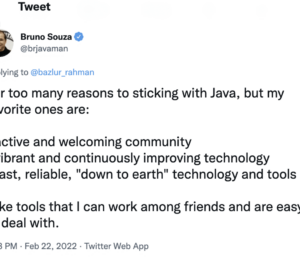Exploring New Features in JDK 23: Simplifying Java with Primitive Type Patterns with JEP 455
- June 06, 2024
- 8361 Unique Views
- 3 min read
Java continues to evolve, introducing features that streamline coding practices and improve readability. JEP 455 is one such proposal that enhances the switch statement, making it more versatile and expressive.
This article delves into how JEP 455 can be utilized to handle complex decision-making scenarios more efficiently. We'll examine a practical example to illustrate the benefits of this feature.
What's New in JEP 455?
This JEP introduces the following key features:
- Primitive Type Patterns: You can use primitive types (like
int, long, boolean, etc.) directly within pattern-matching constructs. This eliminates the need for unnecessary boxing and unboxing of values. - Expanded instanceof and switch: The
instanceofoperator andswitchexpressions have been extended to work seamlessly with primitive types.
Practical Example: User Order Processing
Let's explore a practical example demonstrating how JEP 455 can be applied. We'll create a simple order processing system that distinguishes between logged-in and unrecognized users and processes their orders accordingly.
What I did here was create a file named OrderService.java and then put the following code.
void main() {
var user = new User(12345L, true); //loggedIn user
startProcessing(OrderStatus.NEW, switch (user.loggedIn()) {
case true -> user.id();
case false -> {
log("Unrecognized user");
yield -1;
}
});
user = new User(0L, false); //not loggedIn user
startProcessing(OrderStatus.NEW, switch (user.loggedIn()) {
case true -> user.id();
case false -> {
log("Unrecognized user");
yield -1;
}
});
}
void startProcessing(OrderStatus orderStatus, long userId) {
switch (userId) {
case -1L -> System.out.println("Unrecognized User. Unable to process order.");
default -> {
var message = switch (orderStatus) {
case NEW -> "Order for User %s is received and will start processing";
case PROCESSING -> "Order for User %s is being processed.";
case DISPATCHED, DELIVERED -> "Order for User %s has already been processed";
};
log(String.format(message, userId));
}
}
}
void log(String message) {
println(message);
}
public enum OrderStatus {
NEW,
PROCESSING,
DISPATCHED,
DELIVERED
}
record User(long id, boolean loggedIn) {
}
In this example, we create a User object with an ID and a loggedIn status. The switch expression inside the startProcessing method evaluates whether the user is logged in.
If the user is logged in, their ID is used for processing; if not, a log message is generated, and -1 is yielded to indicate an unrecognized user. The startProcessing method then uses another switch statement to handle different OrderStatus values.
Appropriate messages are printed depending on the order status, demonstrating the efficiency and clarity achieved using JEP 455. This nested switch usage showcases how the new expression syntax simplifies complex decision-making logic.
This code uses the instance main method and shorter println method that is available through JEP 477. More on JEP 477 can be found in this infoQ story:
NOTE: This is a preview language feature, available through the --enable-preview flag with the JDK 23 compiler and runtime. To try the examples above in JDK 23, you must enable the preview features:
- Compile the program with
javac --release 23 --enable-preview OrderService.javaand run it withjava --enable-preview OrderService; or, - When using the source code launcher, run the program with
java --enable-preview OrderService.java; or, - When using jshell, start it with jshell
--enable-preview.
Since JDK 23 isn’t officially available yet, the Early-Access Builds version is available through SDKMAN, which makes it easier to manage and install. I have installed the 23.ea.25-open
If you don’t have SDKMAN, use this resource to download and install it. In addition to SDKMAN, the OpenJDK JDK 23 Early-Access Builds are available here.
Conclusion
As Java continues to evolve, features like JEP 455 demonstrate the language's commitment to modernizing and improving developer productivity. Embrace these changes to write more efficient and readable code and stay ahead in the ever-evolving landscape of Java development.
More about this JEP can be found in this InfoQ news.
Don’t Forget to Share This Post!










Comments (2)
Pierre-Yves
2 years agoThanks for this post ! Line 3 and line 12 could be simplify if the startProcessing was taking a User as the second parameter and be responsible of retrieving it. This would avoid to retrieve to inline a switch twice in the startProcessing method parameter passing :-)
Java Weekly, Issue 546 | Baeldung
2 years ago[…] >> Exploring New Features in JDK 23: Simplifying Java with Primitive Type Patterns with JEP 45… [foojay.io] […]